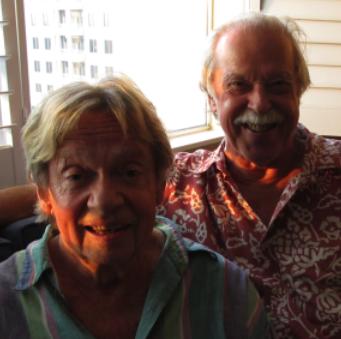
Partners James Cunningham and Martin Hunter co-wrote The Gentleman Caller. Credit: Promotional photo
“[H]e is the long delayed but always expected something that we live for,” says Tom Wingfield in the first scene of Tennessee Williams’ most famous play, The Glass Menagerie.
In that moment, Tom is talking about the suitor he believes has appeared for his homely sister.
In Martin Hunter and James Cunningham’s new play, The Gentleman Caller, the title of which makes reference to this ultimately unattainable person, this quote reappears with new meaning.
The play opens with Williams poised at the end of his life: drunk, high and wanting for companionship. Enter the hustler, a young, dumb, pretty thing who comes to Williams through a hotel room window one night and summons up the best and worst of Williams’ memories in an almost hallucinogenic confrontation with his past relationships.
“It’s a very human, a very sensitive picture of Williams,” says Harrison Thomas, who plays the role of the hustler in the play’s world premiere run at Hart House Theatre. “It focuses on some of the sad aspects of the end of his life: the drug use, the ego that was such a part of him and his deep regret. It’s about his humanity.”
Director David Ferry agrees: “The point of view is a very selective one, what might have flashed through Tennessee Williams’ head in his last, inebriated moments.”
Yet the play, however frank, is not devoid of humour. Nor is Williams’ story without hope.
“This definition of the ‘gentleman caller’ translates into a desire for redemption, ultimately resulting in Tennessee Williams’ willingness to move on to the next life,” reflects Thomas.
It is telling that Williams’ redemption comes through a boy many decades younger than he: the hustler serves not only as a typical object of desire for the famously promiscuous Williams, but also as a blank slate upon whom Williams can project his past.
“He represents and momentarily morphs into most of the main men in Tennessee Williams’ life,” Hunter says.
The unstable, even sentimental, encounter between these two characters, dramatically positioned as potential lovers, seems to invite a historical inquiry: how do queers of different generations relate to each other? And how do their experiences of relationships and identity intersect and diverge?
“I think the play is a pretty accurate depiction of gay life for older men in the late ’70s and ’80s, when many of Williams’ generation came out of the closet but were still scarred by the repression they had lived through in the early years of the 20th century,” Hunter says. “Williams and the hustler come close to, but don’t quite get it on, [which is] maybe also typical of that generation.”
Hunter co-wrote the play with Cunningham, his partner, whom he met in Toronto in the 1950s. They have both had prominent careers in Canadian theatre and share a deep sense of kinship with Williams and his work, having directed several of his major plays.
“Both Jamie and I have known Williams’ work for over 60 years. Gradually, his character took shape for us,” Hunter explains humbly. “We came to think that either one of us might be Tennessee Williams. Except that he had a much bigger talent.”

 Why you can trust Xtra
Why you can trust Xtra


